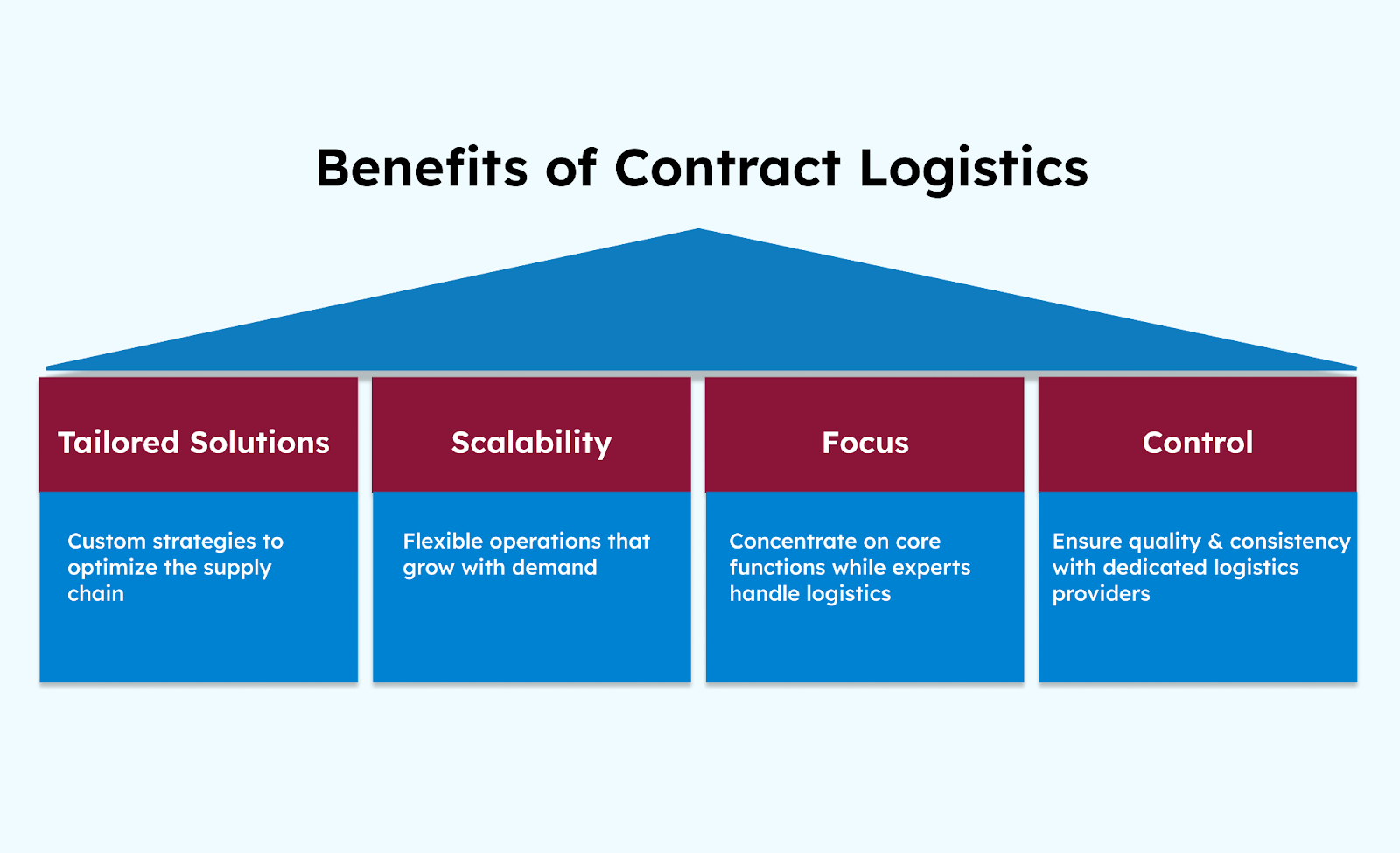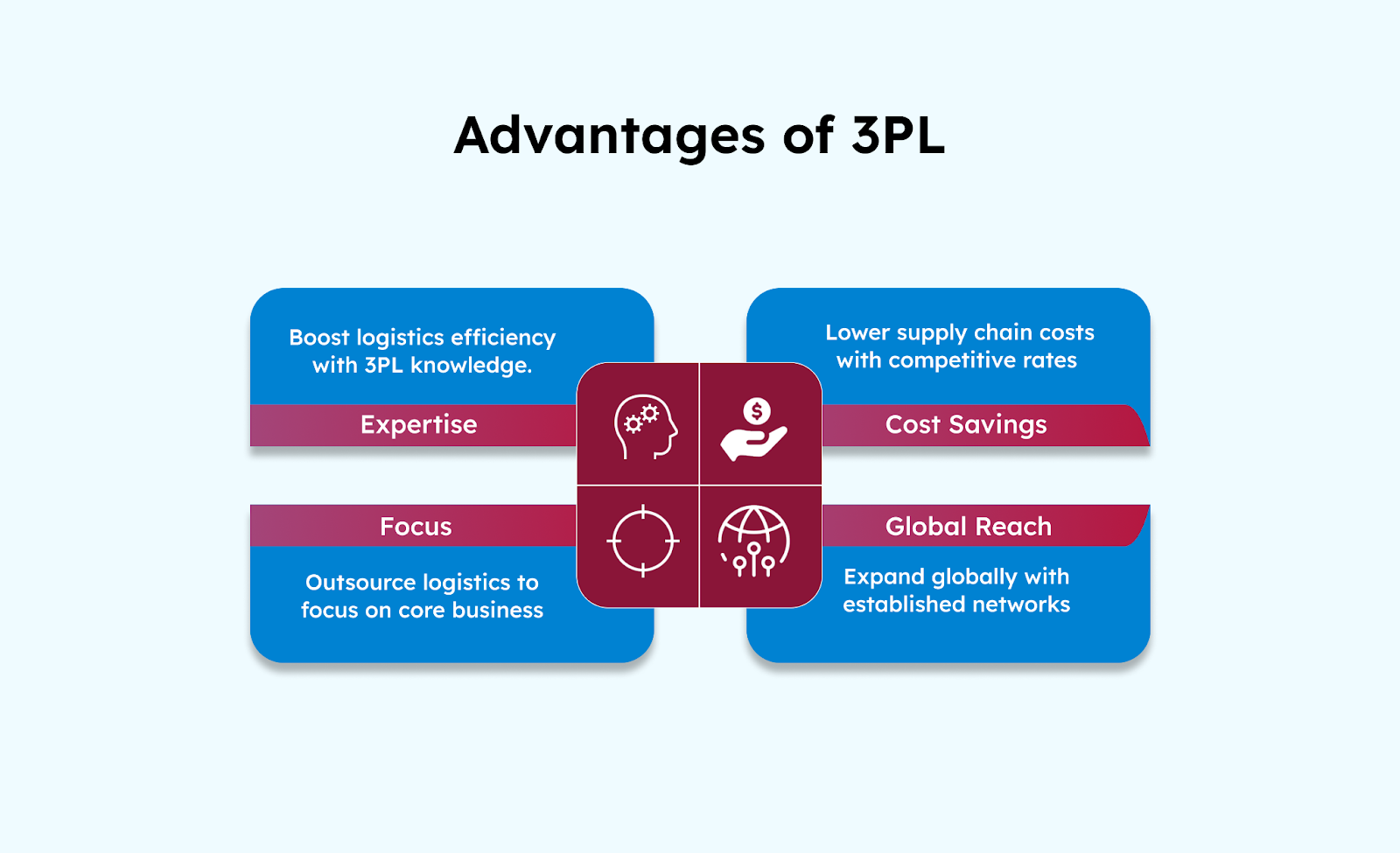Improving logistics operations is a challenge many businesses face today. With increasing competition and customer expectations, finding the right logistics solution is crucial to staying ahead. Two popular options are contract logistics and third-party logistics (3PL), but choosing the right one can be confusing. While both can help improve efficiency and reduce costs, each has its own set of benefits and limitations.
In this blog, we’ll break down the key difference between contract logistics and 3PL, highlighting their advantages and potential challenges to help you make the best decision for your business.
What is Contract Logistics?
Contract logistics involves outsourcing specific parts of your supply chain to a logistics provider. Instead of handling everything yourself, you can focus on key areas like transportation, warehousing, inventory management, or order fulfilment. The best part? It’s highly specialised and can be customised to fit your business needs. This means you receive tailored solutions that directly address your operational challenges, enabling things to run more smoothly and efficiently.
Key Functions of Contract Logistics:
- Transportation Management: Planning and optimising the movement of goods.
- Warehousing and Inventory Management: Storing and tracking products within dedicated warehouse spaces.
- Order Fulfilment: Managing order picking, packing, and delivery.
- Custom Packaging: Designing packaging solutions to protect products and enhance customer experience.
- Returns Management: Handling returns and exchanges efficiently to maintain customer satisfaction.
By outsourcing these critical functions, businesses can focus on their core operations while benefiting from the efficiency and cost-effectiveness that come with specialised logistics services. However, if you’re looking for a more end-to-end solution that covers your entire supply chain, third-party logistics (3PL) might be the right choice.
Understanding 3PL (Third-Party Logistics)
Third-party logistics (3PL) providers handle all of a business's logistics needs, offering a complete solution that covers transportation, warehousing, inventory management, and order processing. It’s a one-stop service for businesses looking to simplify their supply chain. 3PL providers often work with multiple clients and can utilise both asset-based and non-asset-based models, handling every aspect of the logistics process from start to finish.
Core Services Provided by 3PL:
- Complete Logistics Management: End-to-end services covering every aspect of the supply chain.
- Warehousing and Distribution: Managing storage, inventory, and shipping.
- Transportation and Freight Management: Ensuring efficient movement of goods.
- Technology Integration: Using advanced tools to improve logistics operations.
- Customs Clearance: Handling paperwork and regulatory requirements for international shipments.
- Risk Management: Identifying and mitigating risks to ensure smooth and secure logistics operations.
For businesses seeking an all-in-one logistics partner, 3PL offers the flexibility to scale operations efficiently without managing multiple vendors or services. However, choosing between 3PL and contract logistics depends on your specific needs. Let’s understand the key differences between these two logistics models to help you determine which one best suits your business.
Key Differences Between Contract Logistics and 3PL
Although both contract logistics and 3PL aim to simplify logistics, they differ in scope, flexibility, and the degree of customisation they offer. By understanding the differences between Contract Logistics and 3PL, businesses can better determine which option best fits their specific needs and helps them achieve their logistics goals. Here are some key differences:
Contract logistics offers specialised, tailored solutions for specific supply chain needs, while 3PL provides a broad range of end-to-end services. The choice between them depends on whether you need a more focused, customised approach or a complete logistics solution for your business.
Benefits of Contract Logistics

Contract logistics helps businesses build flexible, goal-driven supply chain strategies backed by expert support. It’s ideal for companies seeking tailored solutions that adapt to their growth and operational shifts. Here’s how contract logistics can add value to your operations:
- Tailored Solutions: Businesses can collaborate with providers to develop strategies that address their specific logistics needs, ensuring that every part of the supply chain is optimised to support their goals.
- Scalability: Contract logistics enables businesses to scale their operations in response to fluctuating demand, providing flexibility as business needs evolve.
- Improved Focus on Core Operations: With logistics managed by experts, businesses can concentrate on their primary functions, such as product development and customer engagement, without being hindered by logistics challenges.
- Better Control over Quality and Performance: Collaborating with a dedicated logistics provider enables businesses to exert greater control over the quality and consistency of their logistics processes, ensuring a reliable service.
Contract logistics is a great choice for businesses that require specialised, tailored solutions to enhance specific aspects of their supply chain. However, if you're looking for an approach that handles your entire supply chain, 3PL services might be a better fit. Let's explore the benefits of 3PL and how it can offer a comprehensive solution for your logistics needs.
Advantages of 3PL:

For businesses seeking an end-to-end logistics solution, 3PL providers manage everything from warehousing to delivery. They’re a great fit for companies that need scalable, flexible logistics as they grow. Here’s how 3PL services can support your operations:
- Access to Expertise: 3PL providers offer specialised industry knowledge, enabling businesses to enhance their logistics processes and efficiency.
- Cost Efficiency: By handling multiple clients, 3PL providers offer competitive rates on logistics services, reducing overall supply chain costs.
- Global Reach: 3PL providers often have established networks across multiple regions, enabling businesses to expand internationally without needing to build their own logistics infrastructure.
- Focus on Core Competencies: By outsourcing logistics to 3PL providers, businesses can concentrate more on their core functions, such as product development and customer service, while entrusting logistics operations to experts.
By outsourcing logistics, companies can focus on growth while benefiting from advanced technologies and global reach. Now, let’s understand when to choose contract logistics versus 3PL so that you can make the best decision for your business needs.
Choosing Between Contract Logistics and 3PL
When to Choose Contract Logistics or 3PL? The decision between contract logistics and 3PL depends on your business’s logistical needs and growth aspirations. The difference between Contract Logistics and 3PL becomes evident when you evaluate your specific logistics needs and long-term objectives, allowing you to make the right choice for your business. Here are some factors to consider:
Choosing Contract Logistics
Contract logistics is ideal for businesses with specific supply chain challenges, such as managing inventory or warehousing. It offers specialised, cost-effective solutions to improve these areas and enhance efficiency in key parts of the logistics process.
When to Choose Contract Logistics:
- You need highly specialised solutions for a particular part of the supply chain.
- Your business faces specific logistical challenges that require tailored strategies.
- You’re looking for more control and customisation over your logistics operations.
Choosing 3PL
3PL is ideal for businesses that need a comprehensive logistics solution. It offers scalability and flexibility, making it perfect for companies expanding into new markets or operating across multiple regions. With 3PL, all logistics functions, from warehousing to transportation, are managed under one roof.
When to Choose 3PL:
- Your business needs a solution that handles every step of the supply chain.
- You’re looking for scalability and the ability to adjust to changes in demand quickly.
- Your business is expanding or dealing with complex logistics operations.
By evaluating your specific logistics needs and long-term growth goals, you can determine whether contract logistics or 3PL is the best fit for your business. It is also important to consider the challenges associated with outsourcing logistics services. Let’s take a look at some of the key challenges you might face.
Challenges of Outsourcing Logistics Services
While outsourcing logistics functions can offer numerous benefits, it also comes with its own set of challenges. Businesses must carefully consider these risks before choosing a provider.
- Operational Risks: Dependency on an external provider can lead to risks, such as late deliveries or service disruptions.
- Loss of Control: Outsourcing can reduce direct control over logistics processes, which may be a concern for some businesses.
- Service Quality Variability: Depending on the provider, service quality can vary, leading to inconsistencies in delivery and customer satisfaction.
- Communication Challenges: Working with an external provider can lead to communication gaps, especially when dealing with multiple stakeholders or international logistics.
- Hidden Costs: Outsourcing can reduce operational costs, but providers may charge additional fees for extra services, scope changes, or unforeseen issues.
- Integration Issues: Integrating third-party systems with your own can be complicated, leading to delays or complications in real-time tracking and reporting.
Being mindful of these challenges can help you manage the decision-making process more effectively, ensuring that you choose the logistics model that best suits your business needs. With the right logistics partner, many of these challenges can be addressed efficiently. Let’s now explore how Wareone can support your business with logistics solutions designed to meet your unique needs.
Why Choose Wareone for Your Logistics Solutions
Selecting the right logistics partner is key to enhancing your supply chain. At WareOne, we offer the best of both contract logistics and 3PL, giving you flexibility and control. Here’s how we stand out:
- Flexible Storage: Scale your storage needs with ease. Whether you need the consistency of contract logistics or the adaptability of 3PL, we offer both options with no long-term commitments.
- Pay-As-You-Go: Only pay for what you use. With 3PL, save up to 30% on logistics costs, or choose contract logistics for predictable, long-term cost control.
- Instant Booking & Full Control: Easily manage your logistics with a digital platform that offers real-time booking, transparent pricing, and full inventory visibility.
- Smarter Transport: Access flexible transport services. With 3PL, you pay only for the truck space you need, starting at QAR 75 per CBM, while contract logistics can provide stable, dedicated transport solutions.
- Total Flexibility: Modify, extend, or cancel bookings anytime, with no extra fees or penalties.
WareOne takes a customer-centric approach to enhance your logistics operations and improve supply chain efficiency. We offer flexible and scalable solutions that adapt to your business needs as it grows and evolves.
Wrapping Up
Both contract logistics and 3PL offer valuable benefits, depending on the nature and needs of your business. If you’re looking for a highly specialised and tailored approach to specific areas of logistics, contract logistics is a great choice. On the other hand, if you need a comprehensive, end-to-end solution to manage your entire supply chain, 3PL is a better option.
The difference between Contract Logistics and 3PL is clear; both models offer unique benefits. Regardless of which model you choose, outsourcing logistics operations can significantly improve efficiency, reduce costs, and support business growth. With Wareone’s flexible warehousing solutions, your business can simplify operations and scale effortlessly as it grows. Contact Wareone to learn how our logistics solutions can improve your supply chain and increase efficiency.
.jpg)